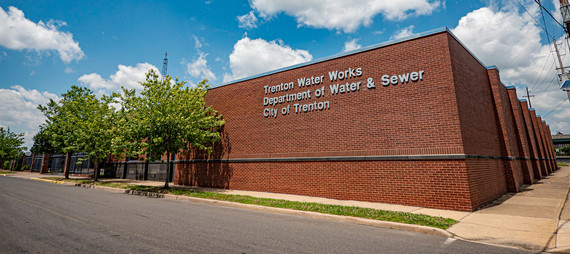In addition to securing a $433,044 grant from the New Jersey Board of Public Utilities to fund a $1-million water loss project, Mayor W. Reed Gusciora announced Thursday, July 29, further progress that Trenton Water Works has made to strengthen its operations, advance capital projects and maintain high water quality.

“Trenton Water Works’ impressive reorganization and modernization efforts have continued in the last 19 months,” said Mayor Gusciora. “TWW has made substantial progress on lead, corrosion control, water quality, human resources and training, capital projects, and day-to-day operations. I believe we have set Trenton Water Works on a clear and deliberate path toward higher water quality, operational success, a stronger workforce, and essential capital improvements.”
Since Mayor Gusciora took office more than 1,100 days ago, he has made reorganizing and strengthening Trenton Water Works one of his top priorities. In the last 24 months, TWW has developed a $405-million capital plan, updated its rate and fee structure, reduced its vacancy rate to five percent, developed a training and apprenticeship program for TWW employees, advanced the removal of lead infrastructure, captured new resources, and completed and started new projects at its water-filtration plant and 122-year-old Pennington Avenue Reservoir.
Here is a summary of TWW’s recent accomplishments:
Removing Lead Infrastructure. In the past few years, Trenton Water Works has taken significant steps to reduce lead in drinking water. These actions include testing for lead at sites in the TWW system, implementing corrosion control, replacing lead service lines in its water-distribution system and at private homes, and educating customers about lead in drinking water through its H2Open community forums and communications. Since February 2020, despite the COVID-19 public health emergency, TWW launched its $150-million Lead Service Line Replacement Program (LSLRP). As a result, more than 5,000 lead services have been replaced with safer copper, representing more than 14 percent of the water utility’s lead inventory of 31,791 lead service lines. This database has been constructed using service records and visual inspections.
In the next eight months, TWW will replace more than 3,600 lead services in Lawrence, Hamilton and Ewing Townships, using three publicly awarded contract vendors: JAS Group, a minority-owned enterprise; Petrongolo Contractors; and Spiniello Companies. These contractors are contacting homeowners signed up for TWW’s LSLRP to make appointments to visually verify their service-line pipe material.
Corrosion Control. TWW’s corrosion control program, launched in December 2019, uses the FDA-approved, industry-proven zinc orthophosphate. The food additive effectively provides a protective barrier by coating the inside of water service lines and household plumbing to prevent lead particles from seeping into drinking water. TWW is required by regulation to collect a minimum of 100 Lead and Copper Compliance samples once biannually, monitoring 200 homes for lead and copper in its testing schedule. From January 2021 to June 2021, of the 104 samples that were collected and reported, only two locations exceeded the Lead Action Level with no overall violation of the Lead and Copper 90th percentile of 15 parts per billion, a key marker that indicates TWW’s corrosion control program is effective. With 63,000 metered customers, TWW serves nearly 250,000 consumers in its five-municipality service area: Trenton, Hamilton, Ewing, Lawrence, and Hopewell Townships.
Water-Filtration Plant Resilience. To help make TWW’s water-filtration plant on Route 29 South in Trenton more resilient as it draws water from the Delaware River, a $5.5-million project to renovate the plant’s RAW water intake is underway to make it less susceptible to frazzle ice buildup in winter, turbidity, branches, leaves, and other organic matter. Construction started in the summer of 2021 and is estimated to be complete in the spring of 2022. The renovated intake, improvements mandated by the New Jersey Department of Environment Protection, will feature better screens to remove obstructions using compressed air instead of pausing plant operations to perform a backwash/reverse water flow procedure. Also, concerning other key water-filtration systems, all 24 filters have been replaced, a $2-million project, and expansion of corrosion control to the TWW system’s gravity-fed area (a small area of South Trenton along the Delaware River) is complete.
Leak Detection and Water Loss Control. Although TWW tracks the annual volumes of water it draws from the Delaware River, including the finished drinking water product that it produces, water loss is an issue that TWW leadership has proactively focused on. Leveraging a $433,044 grant from the N.J. Board of Public Utilities (BPU) to fund a $1-million project, TWW will utilize acoustic leak detection technology—sensors placed strategically throughout the TWW system—to pinpoint and repair leaks in its expansive 683-mile water distribution system. The grant was successfully secured by team members in TWW’s engineering unit, which is responsible for overseeing the day-to-day operations of the water-distribution system. This system includes the 100-million-gallon Pennington Avenue Reservoir, 683 miles of various-sized water mains, 3,517 fire hydrants, nearly 8,000 valves, six interconnections with other water purveyors, storage tanks, and three pump stations.
“Thank you to Noemi de la Puente and Rick Warren of our engineering unit, whose hard work and commitment helped secure the BPU grant that we will leverage with other resources to implement an effective program to prevent water loss,” said Mark A. Lavenberg, Director of the city’s Department of Water and Sewer, which operates Trenton Water Works. “With the help of our capable team, including water-distribution technician Tim London and W-4 licensed operator Edmund Johnson, our imperative is to be proactive, not reactive, in detecting and repairing leaks in our system.”
Workforce Development. To cultivate future water operators, TWW launched a training and apprenticeship program, which is taught onsite by Andrew Pappachen, a 46-year veteran water-industry executive, in partnership with Mercer County Community College, New Jersey Water Association, and the New Jersey Department of Labor and Workforce Development. The 180-hour operator prerequisite course equips participants with the education necessary to advance their careers and pursue higher-level jobs in TWW’s water-treatment and distribution operations. Since its inception in September 2020, the program has graduated 14 students and welcomed 14 new students for the 2022 class.
Customer Service. In the last 24 months, TWW has improved its customer service platform— adding additional ways for customers to pay their quarterly bills, hiring bilingual customer service representatives, and installing a more robust telephone system at its Cortland Street operations center.
“Our customers have asked us for more convenient ways to pay their bills, so we added Invoice Cloud, a payment-processing service that allows our customers to manage their accounts and pay bills online and by telephone using a credit card,” said Michael Walker, Chief of Communications and Community Relations.
TWW customers can learn more about Invoice Cloud by visiting trentonwaterworks.org and clicking on the “Pay Your Bill” link. To pay by telephone, you can call 1-855-667-0982.
Questions concerning TWW’s reorganization, capital projects—including its Lead Service Line Replacement Program—and the H2Open Virtual Community Forums can be referred to the Office of Communications and Community Relations, at (609) 989-3033.





